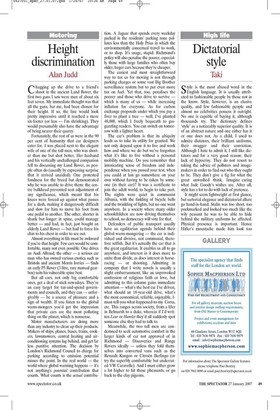Height discrimination
Alan Judd Chugging up the drive to a friend's shoot in the ancient Land Rover, the first two guns I saw were men of about six feet seven. My immediate thought was that all the guns, bar me, had been chosen for their height. If so, the line would look pretty impressive until it reached a mere six-footer (or less — I'm shrinking). They would presumably also have the advantage of being nearer their quarry.
Fortunately, the rest of us were in the 90 per cent of humanity that car designers cater for. I was placed next to the elegant wife of one of the tall men, who was shorter than me but shot better. Her husband and his vertically unchallenged companion fell to discussing my Land Rover, as people often do (usually by expressing surprise that it arrived unaided). One protested fondness for the breed but demonstrated why he was unable to drive them: the centre bulkhead prevented seat adjustment of any significance, which meant that his knees were forced up against what passes for a dash, making it dangerously difficult and slow for him to move his foot from one pedal to another. The other, shorter in shank but longer in spine, could manage better — and had, in fact, just bought an elderly Land Rover — but had to force his chin to his chest in order to see out.
Almost everything in life must be awkward if you're that height. Few cars would be comfortable, many not even possible. One drives an Audi Allroad, the other — a serious car man who has owned various exotica such as Bristols and ancient Morris lorries — finds an early P5 Rover (3 litre, rare manual gearbox) suits his vulnerable spine best.
But all cars, not only big comfortable ones, get a deal of stick nowadays. They're an easy target for tax-and-spend governments and councils, and they can — unforgivably — be a source of pleasure and a sign of wealth. If you listen to the global warm-mongers you'd get the impression that private cars are the most polluting thing on the planet, which is nonsense.
Motor manufacturers are doing more than any industry to clean up their products. Makers of ships, planes, buses, trains, cookers, lawnmowers, central heating and airconditioning systems lag behind, and get far less punitive attention. The decision by London's Richmond Council to charge for parking according to emission potential misses the point. In the real world — the world where global warming happens — it's not anything's potential contribution that counts. What counts is the actual contribution. A Jaguar that spends every weekday parked in the residents' parking zone pollutes less than the Holy Prius in which the environmentally concerned travel to work, or to shop. It's usage, stupid. Richmond's policy will also penalise the poorer, especially those with large families who often buy older, larger cars because they're cheaper.
The easiest and most straightforward way to tax us for moving is not through parking charges or some vast Big Brother surveillance system but to put even more tax on fuel. Yet that, too, penalises the poorer and those who drive to survive — which is many of us — while increasing inflation for everyone. As for carbon exchange proposals under which you pay a fiver to plant a tree — well, I've planted 48,000, which I freely bequeath to gasguzzling readers. You can switch on tomorrow with a lighter heart.
The car's problem is that its ubiquity leads us to take its utility for granted. We not only depend upon it to live and work how and where we do but we've forgotten what it's like to live without a personal mobility machine. Do you remember that intoxicating sense of freedom and independence when you passed your test, when you could at last go somewhere on your own without having to be taken by someone (in their car)? It was a certificate to join the adult world, to begin to take part. The nights were quiet in communist Albania, with the tinkling of bicycle bells and the twinkling of lights, but no one went anywhere. In a society where many older schoolchildren are now driving themselves to school, no democracy will vote for that.
Defenders of public transport usually have an egalitarian agenda behind their global warm-mongering — the car is individual and divisive, not communal, therefore selfish. But it's actually the car that is the great egalitarian. It enables us all to go anywhere, and interest in it does more to unite than divide, as does interest in horseracing — or shooting. Admitting in company that I write novels is usually a slight embarrassment, like an unprovoked confession of religious faith or love, but admitting to this column gains immediate attention — what's the best car I've driven, what should an 18-year-old drive, what's the most economical, reliable, enjoyable, Imust-tell-you-what-happened-to-my Corsa, etc. This ranges across society, from a lifer in Belmarsh to a duke, whereas if I'd written Lear or Hamlet they'd all suddenly spot someone else they had to talk to.
Meanwhile, the two tall men are condemned to seek automotive comfort in the larger kinds of car not approved of in Richmond — Discoveries and Range Rovers ideally — unless they fold themselves into converted vans such as the Renault Kangoo or Citroen Berlingo (or try the superbly comfortable but underrated VW Caravelle). And I must either grow a lot higher to hit those pheasants, or go back to the clay pigeons.














































 Previous page
Previous page